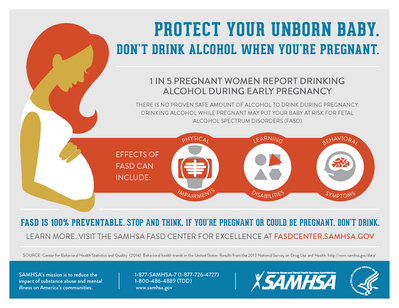Fetal Alcohol Spectrum Disorder (FASD): Difference between revisions
No edit summary |
No edit summary |
||
| Line 5: | Line 5: | ||
</div> | </div> | ||
== Introduction == | == Introduction == | ||
[[File:Fetal Alcohol Spectrum Disorders (FASD) in the United States (22185062444).png|right|frameless|399x399px]] | |||
Fetal alcohol spectrum disorder (FASD) refers to a range of problems caused by exposure of a fetus to alcohol during pregnancy. | Fetal alcohol spectrum disorder (FASD) refers to a range of problems caused by exposure of a fetus to alcohol during pregnancy. | ||
| Line 13: | Line 14: | ||
== Sub Heading 2 == | == Sub Heading 2 == | ||
== | == Epidemiology == | ||
It is considered one of the commonest preventable causes of intellectual impairment. The estimated incidence in the western world is at around ~10% for FASD It may affect up to 20-40% of pregnancies in mothers with chronic alcohol abuse.<ref>Radiopedia [https://radiopaedia.org/articles/fetal-alcohol-syndrome Fetal alcohol syndrome] Available: https://radiopaedia.org/articles/fetal-alcohol-syndrome (accessed 16.10.2021)</ref> | |||
== Physiotherapy == | |||
Although there are many consequences of FASD, the focus for physical therapy is the neuromotor abnormalities associated with F AS, that may require consultation or intervention. | |||
There are several elements that promote success in the management of FASD. | |||
# A correct diagnosis must be made. | |||
# An appropriate treatment program that addresses specific symptoms must/be designed. | |||
# The treatment program and outcomes with respect to the child with FAS must be monitored carefully. Treatment programs for children with FAS should address impairments with intellectual, behavior, and social functioning61 , as well as motor deficits<ref>Emerson ML. Fetal alcohol syndrome: physical therapy implications and treatment strategies. Available:https://commons.und.edu/pt-grad/128/ (accessed 16.10.2021)</ref> | |||
== Resources == | == Resources == | ||
Revision as of 02:21, 16 October 2021
Original Editor - Lucinda hampton
Top Contributors - Lucinda hampton, Kirenga Bamurange Liliane and Kim Jackson
Introduction[edit | edit source]
Fetal alcohol spectrum disorder (FASD) refers to a range of problems caused by exposure of a fetus to alcohol during pregnancy.
- There is no cure for FASD and its effects last a lifetime.
- A person with FASD can get help with their learning and behaviour to maximise their independence and achievements.
- Not drinking alcohol during pregnancy is the safest option[1].
Sub Heading 2[edit | edit source]
Epidemiology[edit | edit source]
It is considered one of the commonest preventable causes of intellectual impairment. The estimated incidence in the western world is at around ~10% for FASD It may affect up to 20-40% of pregnancies in mothers with chronic alcohol abuse.[2]
Physiotherapy[edit | edit source]
Although there are many consequences of FASD, the focus for physical therapy is the neuromotor abnormalities associated with F AS, that may require consultation or intervention.
There are several elements that promote success in the management of FASD.
- A correct diagnosis must be made.
- An appropriate treatment program that addresses specific symptoms must/be designed.
- The treatment program and outcomes with respect to the child with FAS must be monitored carefully. Treatment programs for children with FAS should address impairments with intellectual, behavior, and social functioning61 , as well as motor deficits[3]
Resources[edit | edit source]
- bulleted list
- x
or
- numbered list
- x
References[edit | edit source]
- ↑ Better Health FASD Available: https://www.betterhealth.vic.gov.au/health/conditionsandtreatments/fetal-alcohol-spectrum-disorder-fasd#bhc-content (accessed 16.10.2021)
- ↑ Radiopedia Fetal alcohol syndrome Available: https://radiopaedia.org/articles/fetal-alcohol-syndrome (accessed 16.10.2021)
- ↑ Emerson ML. Fetal alcohol syndrome: physical therapy implications and treatment strategies. Available:https://commons.und.edu/pt-grad/128/ (accessed 16.10.2021)







